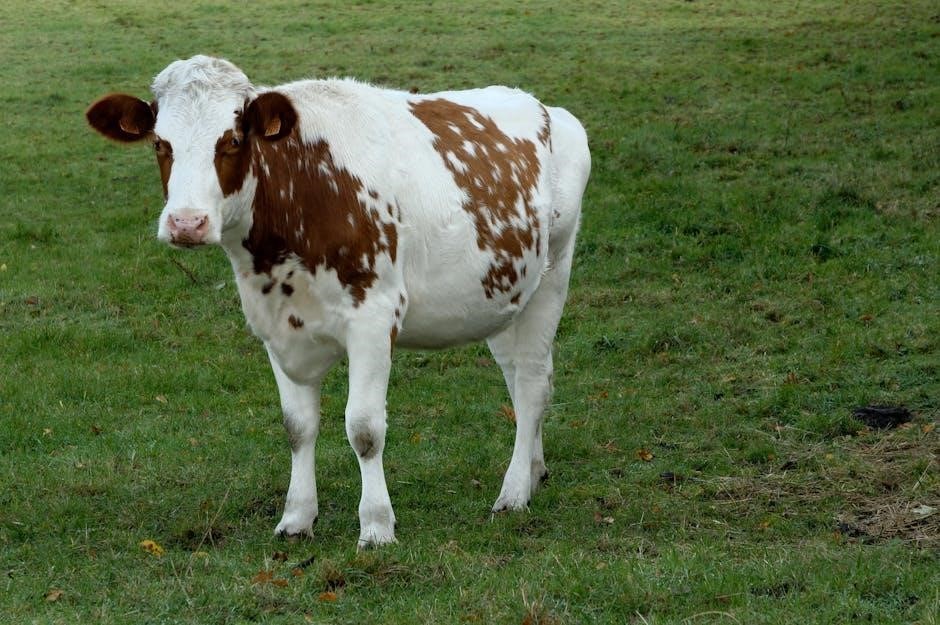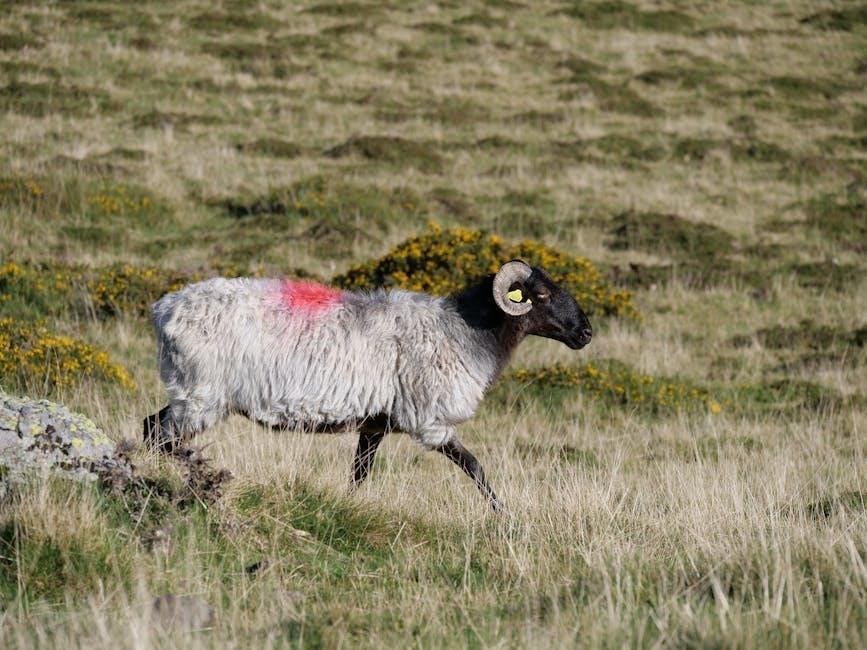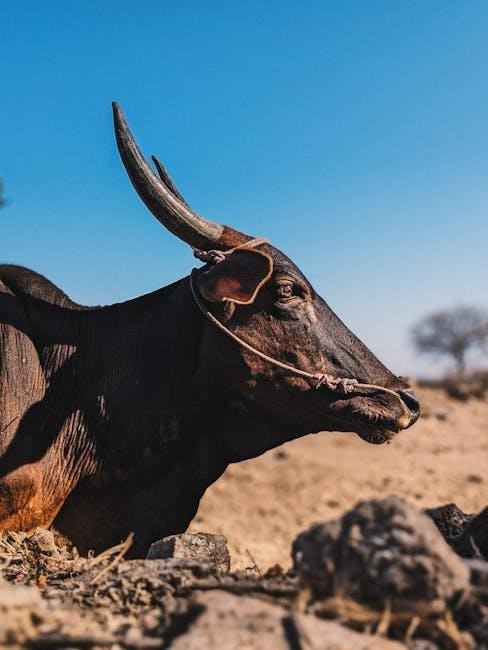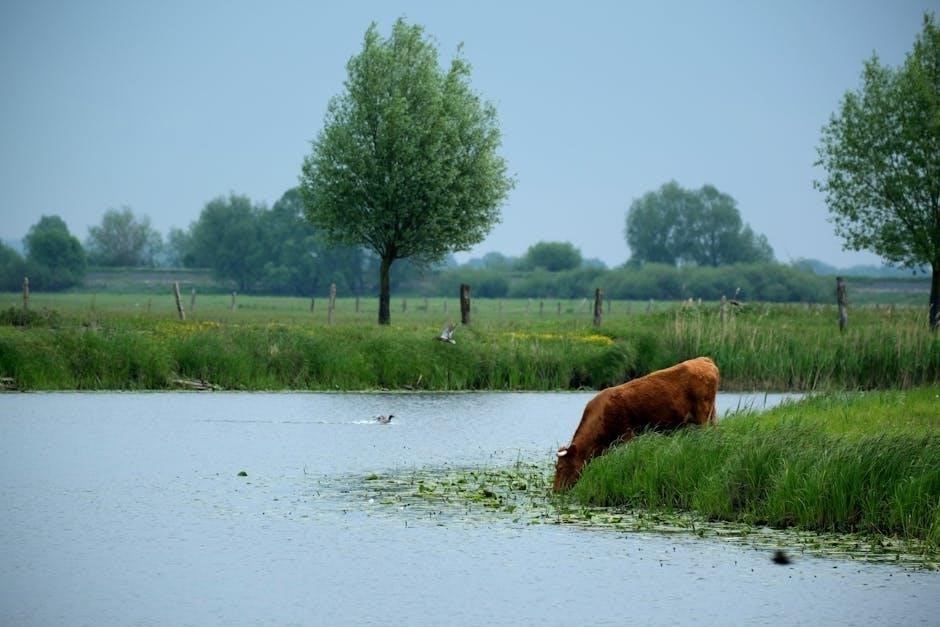Welcome to the Animal Farm Study Guide, your comprehensive resource for understanding George Orwell’s timeless allegory. Explore themes, characters, and chapter-by-chapter analysis to deepen your comprehension.
Background and Context of the Novel
George Orwell’s Animal Farm is an allegorical novel reflecting the events of the Russian Revolution and the rise of Stalinism. Published in 1945, it critiques totalitarian regimes through the lens of a farm where animals rebel against their human oppressor. Orwell’s experiences during the Spanish Civil War and his distrust of authoritarianism deeply influenced the novel’s themes. The story serves as a cautionary tale about power corruption, propaganda, and the loss of idealism. Understanding the historical context, particularly the Russian Revolution, enhances the reader’s ability to interpret the novel’s symbolism and its universal relevance to political systems.
Importance of Study Guides for Understanding the Novel
Study guides play a crucial role in unraveling the complexities of Animal Farm. They provide chapter-by-chapter summaries, analysis of key themes, and insights into symbolic elements. By breaking down the narrative, study guides help readers identify connections to historical events, such as the Russian Revolution. They also offer essay and discussion questions, fostering deeper critical thinking. For students, these resources clarify challenging concepts, like the corruption of power or the role of propaganda, ensuring a comprehensive understanding of Orwell’s allegorical masterpiece and its enduring relevance to political and social discourse.

Key Themes in Animal Farm
The novel explores themes of totalitarianism, the corruption of power, the struggle for equality, and the role of propaganda, highlighting how power dynamics shape societal structures and individual freedoms.
Totalitarianism and Its Impact on Society
In Animal Farm, Napoleon’s rise to power exemplifies the dangers of totalitarianism. By manipulating the Seven Commandments and using fear, he consolidates control, mirroring real-world dictatorships. The novel illustrates how totalitarian regimes suppress dissent, distort truth, and exploit power, leading to societal oppression and loss of individual freedom. The pigs’ abuse of authority highlights the corrupting influence of unchecked power, while the animals’ compliance reveals the psychological impact of propaganda and control. Orwell’s critique remains relevant, warning against the dangers of authoritarian rule and the erosion of democratic values in society.
The Corruption of Power and Its Consequences
The corrupting influence of power is a central theme in Animal Farm. Napoleon, once a ideals-driven leader, becomes a tyrannical dictator, abusing his authority for personal gain. He manipulates the Seven Commandments and exploits the animals’ trust to justify his actions. The pigs’ moral decay is evident as they justify their privileges, leading to inequality and oppression. This mirrors real-world dictatorships, where power often corrupts even well-intentioned leaders. Orwell’s portrayal of Napoleon’s transformation serves as a cautionary tale about the dangers of unchecked power and its destructive consequences on society and morality.
The Struggle for Equality and Justice
In Animal Farm, the animals’ quest for equality and justice drives the narrative. Initially united under the principles of Animalism, they aim to create a fair society free from oppression. However, as Napoleon’s regime tightens, equality erodes, and injustice prevails. The pigs exploit their power, altering the Seven Commandments to justify their dominance. This struggle reflects universal themes of inequality and the challenges of maintaining justice in societies where power imbalances exist. Orwell’s depiction of the animals’ disillusionment highlights the fragility of equality and the ease with which it can be undermined by corruption and greed.
The Role of Propaganda in Shaping Opinions
Propaganda plays a pivotal role in Animal Farm, as it manipulates the animals’ perceptions and maintains the pigs’ control. Squealer, Napoleon’s propagandist, distorts facts and rewrites history to justify the regime’s actions. By altering the Seven Commandments and using persuasive language, Squealer ensures the animals remain compliant. This manipulation highlights how propaganda can shape public opinion, erode truth, and sustain authoritarian regimes. Orwell’s portrayal underscores the dangers of unchecked rhetoric and the importance of critical thinking in discerning reality from illusion.
Main Characters in Animal Farm

The novel features dynamic characters like Old Major, the visionary; Napoleon, the power-hungry leader; Snowball, the idealist; Boxer, the loyal worker; and Benjamin, the wise skeptic.
Old Major: The Visionary Leader
Old Major, a wise and aged boar, serves as the inspiration for the rebellion. His passionate speech in Chapter 1 unites the animals, outlining the principles of Animalism. He emphasizes equality, freedom, and the rejection of human vices like alcohol and exploitation. Old Major’s vision of a utopian society motivates the animals to rebel against Mr. Jones. His death shortly after the speech symbolizes the loss of idealism, leaving the farm in the hands of less principled leaders. His legacy remains a guiding force for the animals.
Napoleon: The Power-Hungry Dictator
Napoleon, a cunning and ambitious pig, rises to power after Old Major’s death. He manipulates the animals, using fear and propaganda to maintain control. Napoleon gradually corrupts the principles of Animalism, altering the Seven Commandments to justify his actions. His leadership becomes authoritarian, prioritizing the pigs’ interests over the farm’s well-being. Napoleon’s greed and paranoia lead to the exploitation of the animals, transforming the farm into a dictatorship. His reign exemplifies the dangers of unchecked power and the betrayal of revolutionary ideals.
Snowball: The Idealistic Revolutionary
Snowball, a charismatic and intelligent pig, emerges as a key leader in the early stages of the rebellion. He is passionate about spreading the ideals of Animalism and improving the farm’s conditions; Snowball’s innovative ideas, such as the windmill project, reflect his vision for progress and equality. However, his rivalry with Napoleon leads to his expulsion from the farm. Despite his idealism, Snowball’s downfall highlights the challenges of maintaining revolutionary principles in the face of power struggles. His legacy remains a symbol of lost potential and the corruption of ideals.
Boxer: The Loyal and Hardworking Horse
Boxer, a majestic and dedicated workhorse, embodies loyalty and perseverance. His unwavering commitment to the farm’s success drives him to work tirelessly, even when exhausted. Boxer’s motto, “I will work harder,” reflects his unshakable dedication to the animals’ cause. Despite his physical strength, he is kind and gentle, earning the respect of all. However, his naivety and blind loyalty make him vulnerable to exploitation by the pigs. Boxer’s tragic fate serves as a poignant reminder of the consequences of unchecked power and the exploitation of the working class.
Benjamin: The Wise and Skeptical Donkey
Benjamin, the wise and skeptical donkey, is one of the oldest and most intelligent animals on the farm. He remains detached from the political turmoil, observing events with a critical eye. Benjamin’s skepticism toward the pigs’ leadership grows as he witnesses their manipulation of power. His wisdom and ability to read and understand the world around him make him a quiet leader, though his warnings often go unheeded. Benjamin’s loyalty to Boxer and his attempt to protect him highlight his compassionate side, even as he remains a voice of reason in a world dominated by propaganda and deceit.
Chapter-Wise Summary and Analysis
From the rebellion’s spark to the farm’s decline, each chapter explores power struggles, corruption, and the erosion of ideals. Key events like the establishment of Animalism, Napoleon’s rise, and the windmill’s destruction reveal the novel’s timeless themes.
Chapter 1 introduces Manor Farm, owned by the neglectful Mr. Jones, and its inhabitants. The animals, exploited and mistreated, endure poor living conditions. Old Major, a wise boar, calls a meeting to share his vision of a rebellion against humans; His speech emphasizes equality and freedom, inspiring the animals. The chapter sets the stage for the uprising, highlighting the oppressive environment and the seeds of rebellion. Key characters like Boxer, Clover, and Benjamin are introduced, showcasing their unique personalities and roles in the upcoming events.
Chapter 2: The Birth of Animalism and the Seven Commandments
Chapter 2 details the birth of Animalism, a philosophy inspired by Old Major’s vision of equality and freedom. The pigs, led by Snowball and Napoleon, develop Seven Commandments to guide the animals. These include rules like “Whatever goes upon two legs is an enemy” and “No animal shall kill any other animal.” The commandments are painted on the barn, symbolizing unity and shared goals. The animals embrace these principles, believing they will create a fairer society. This chapter lays the foundation for the rebellion and the ideals that will later be corrupted.
Chapter 3: The Rebellion and the Establishment of Animal Farm
Chapter 3 recounts the Rebellion, where the animals, driven by their suffering under Mr. Jones, rise up and expel him from Manor Farm. Renamed Animal Farm, the land is now under animal control. The pigs, led by Snowball and Napoleon, organize the animals, and the farm initially thrives through collective effort. The Seven Commandments serve as the guiding principles, and the animals work together, filled with hope and unity. This chapter marks the beginning of a new era, showcasing the animals’ determination to create a self-sufficient and equal society, free from human oppression.
Chapter 4: The Challenges of Running the Farm
Chapter 4 highlights the difficulties the animals face while managing the farm. The pigs, now in leadership roles, struggle to maintain order and productivity. Snowball and Napoleon disagree on strategies, with Snowball advocating for technological advancements and Napoleon focusing on food production. The animals work tirelessly, but resource shortages and inexperience hinder progress. Additionally, the pigs begin to take on more authoritative roles, subtly shifting the power dynamics. This chapter explores the initial challenges of governance and the emergence of tension among the leaders, foreshadowing future conflicts and the gradual corruption of ideals.
Chapter 5: The Rise of Napoleon’s Tyranny
Chapter 5 marks the escalation of Napoleon’s dictatorship on Animal Farm. Following Snowball’s expulsion, Napoleon consolidates power, manipulating the Seven Commandments to justify his actions. The pigs, now privileged, alter the rules to benefit themselves, such as allowing themselves to drink alcohol. Napoleon uses fear and propaganda to maintain control, discouraging dissent and fostering loyalty. The animals, weary and disheartened, struggle to recognize the corruption of their original ideals. This chapter underscores the dangers of unchecked power and the erosion of equality, as Napoleon’s tyranny solidifies, mirroring the rise of authoritarian regimes in history.
Chapter 6: The Battle of the Windmill and Its Aftermath
Chapter 6 details the dramatic Battle of the Windmill, where the animals defend their farm against a violent attack by neighboring farmers. Despite their bravery, the windmill, a symbol of progress, is destroyed. Napoleon uses the aftermath to consolidate power, blaming traitors and tightening control. The animals, exhausted and disillusioned, are manipulated into believing the destruction was necessary. The pigs alter the Seven Commandments further, justifying their growing privileges. This chapter highlights the manipulation of truth and the erosion of the animals’ ideals as Napoleon’s tyranny deepens, leaving the farm in a state of despair and mistrust.
Chapter 7: The Further Corruption of the Seven Commandments
In Chapter 7, the pigs, led by Napoleon, further distort the Seven Commandments to justify their actions. The commandments are altered to accommodate the pigs’ growing privileges, such as trading with neighboring farms and engaging in luxury. The animals, weary and manipulated, struggle to recognize the betrayal of their original ideals. Squealer, the propagandist, convinces them that the changes are necessary for the farm’s survival. This chapter underscores the pigs’ cunning manipulation of power and the erosion of the animals’ unity, as the farm becomes increasingly authoritarian under Napoleon’s rule.
Chapter 8: The Final Betrayal and the Animals’ Realization
Chapter 8 marks the final betrayal of the animals’ trust as Napoleon’s regime reaches its peak. The pigs, now indistinguishable from humans, announce a full alliance with neighboring farms, completely abandoning the principles of Animalism. The animals, realizing too late the extent of the pigs’ corruption, feel a deep sense of betrayal and hopelessness. The alteration of the Seven Commandments to “All Animals Are Equal / But Some Animals Are More Equal Than Others” serves as a stark reminder of the pigs’ hypocrisy. This chapter highlights the tragic consequences of unchecked power and the loss of idealism.
Chapter 9: The End of the Rebellion and the Farm’s Decline
In Chapter 9, the rebellion collapses as the pigs fully embrace their humanity, erasing the last remnants of Animalism. The Seven Commandments are replaced with “All Animals Are Equal / But Some Animals Are More Equal Than Others,” symbolizing the pigs’ complete corruption. The animals, exhausted and disillusioned, realize their labor has only enriched the pigs. The farm’s decline mirrors the loss of hope and ideals, as the pigs form alliances with neighboring farms, solidifying their tyrannical rule. This chapter underscores the tragic end of the rebellion and the irreversible downfall of the farm.
Chapter 10: The Legacy of Animal Farm
Chapter 10 reflects on the enduring lessons of Animal Farm. The novel serves as a cautionary tale about power corruption and the erosion of ideals. Orwell’s allegory remains universally relevant, warning against totalitarianism and manipulation. The pigs’ rise to power mirrors historical events, offering insights into human nature and governance. The legacy of Animal Farm lies in its timeless critique of oppression and its reminder of the importance of vigilance and equality. Through its vivid characters and events, the novel continues to inspire critical thinking and reflection on societal structures and leadership dynamics.
Symbols and Metaphors in Animal Farm
The barn symbolizes unity, the pigs represent corrupt leadership, and the windmill embodies failed progress, highlighting Orwell’s critique of power and deception in society.
The Barn as a Symbol of Unity and Decision-Making
The barn in Animal Farm serves as a central symbol of unity and collective decision-making. It is where Old Major delivers his visionary speech, inspiring the animals to rebel. The barn becomes a space for gatherings, debates, and the creation of the Seven Commandments. Early on, it represents democracy and shared purpose. However, as the story progresses, the barn’s significance evolves, reflecting the corruption of ideals. It becomes a tool for Napoleon’s manipulation, where decisions are dictated rather than debated. Ultimately, the barn symbolizes both the potential for unity and the erosion of democratic principles under authoritarian rule.
The Windmill as a Symbol of Progress and Corruption
The windmill in Animal Farm represents both progress and corruption. Initially, it symbolizes the animals’ hope for a better future through collective effort and innovation. Its construction is a testament to their unity and ambition. However, under Napoleon’s leadership, the windmill becomes a tool of manipulation and power. Its repeated destruction and rebuilding highlight the exploitation of the animals’ labor and the corruption of their ideals. The windmill ultimately serves as a symbol of how noble goals can be distorted by those in power, reflecting the novel’s critique of authoritarianism and the misuse of resources.
The Pigs as a Representation of the Ruling Class
The pigs in Animal Farm symbolize the ruling class, mirroring human political systems. They begin as leaders of the rebellion, claiming to represent the collective good. Over time, however, they abuse their power, manipulating the Seven Commandments for personal gain. Characters like Napoleon and Snowball embody the corrupting influence of authority, while Squealer serves as the propagandist, justifying their actions. The pigs’ gradual adoption of human traits and behaviors underscores Orwell’s critique of how power corrupts and how revolutionary ideals can be subverted by those who seek to dominate, ultimately leading to oppression rather than equality.
The Dogs as a Representation of Secret Police and Control
The dogs in Animal Farm represent the secret police and tools of control in totalitarian regimes. Trained by Napoleon, they function as enforcers, intimidating and silencing dissent. Their presence creates fear, ensuring compliance with Napoleon’s rules. The dogs embody the oppressive mechanisms that maintain power, reflecting real-world secret police forces. Their unwavering loyalty to Napoleon highlights how regimes use fear and violence to suppress opposition, eroding freedom and maintaining control over the population. This serves as a stark warning about the dangers of unchecked authority and the erosion of individual rights.

Literary Devices Used in Animal Farm
Orwell employs allegory, satire, and irony to critique totalitarianism. Allegory represents historical events, satire mocks political corruption, and irony highlights the gap between ideals and reality, enhancing themes effectively.
Allegory: The Representation of Historical Events
Animal Farm is a masterful allegory mirroring the Russian Revolution and Stalinism. Orwell uses barnyard animals to symbolize key historical figures and events, such as the rise of Napoleon as Stalin and Snowball as Trotsky. The novel vividly portrays how ideals of equality and justice are corrupted by power, reflecting the Soviet Union’s tragic transformation. Through allegory, Orwell critiques authoritarian regimes, making the story universally relatable while maintaining historical specificity. This literary device allows readers to grasp complex political themes through a simplistic yet profound narrative framework.
Satire: Criticizing Political Systems Through Humor
Animal Farm employs biting satire to critique political corruption and manipulation. Orwell uses humor to expose the hypocrisy of authoritarian regimes, particularly Stalinism. Napoleon’s absurd justifications for his actions, like altering the Seven Commandments, mock the ways leaders distort truth. The pigs’ gradual embrace of human behaviors satirizes the betrayal of revolutionary ideals. Orwell’s wit makes the novel both entertaining and thought-provoking, allowing readers to engage with its deeper political and moral commentary. This satirical approach ensures the story remains accessible while delivering a powerful critique of power and corruption.
Irony: The Contrast Between Ideals and Reality
Animal Farm is rich in irony, highlighting the gap between the animals’ ideals and the harsh reality. The pigs’ corruption of the Seven Commandments, such as altering “No animal shall kill any other animal” to justify their actions, exemplifies situational irony. Their claim to represent equality while embracing oppressive practices underscores the irony of their betrayal. Additionally, the animals’ hard work to build a utopia ultimately leads to a dystopia, mirroring the failures of real-world revolutions. Orwell’s use of irony sharpens the novel’s critique of power and the erosion of idealism.

Historical Context and Relevance
Animal Farm reflects the Russian Revolution and Stalinism, offering a critique of totalitarianism. Orwell’s allegory remains universally relevant, highlighting the dangers of power corruption and manipulation.
The Russian Revolution and Its Connection to Animal Farm
George Orwell’s Animal Farm is deeply connected to the Russian Revolution, with characters and events paralleling historical figures. Old Major symbolizes Lenin, inspiring rebellion against oppression, while Napoleon and Snowball represent Stalin and Trotsky, respectively. The novel critiques the corruption of revolutionary ideals, as the pigs gradually mirror the oppressive regime they initially opposed. The rise of totalitarianism and manipulation of power reflect Orwell’s view of Stalinism’s betrayal of the revolution’s principles. This allegory provides a powerful commentary on the cyclic nature of power and control, resonating universally beyond its historical context.
The Rise of Stalinism and Its Reflection in the Novel
Stalinism is vividly portrayed in Animal Farm through Napoleon’s rise to power. Napoleon embodies Stalin’s authoritarianism, manipulating propaganda and eliminating dissent. The pigs’ consolidation of power mirrors Stalin’s purges and centralization of control. The alteration of the Seven Commandments reflects Stalin’s distortion of Marxist ideals. Squealer’s role as propagandist parallels Stalin’s use of media to justify oppression. The novel critiques how Stalinism corrupted revolutionary principles, leading to a totalitarian regime indistinguishable from the tyranny it initially opposed. Orwell’s depiction serves as a cautionary tale about the dangers of unchecked power and ideological manipulation.
The Universal Relevance of the Novel’s Themes
Animal Farm remains universally relevant due to its exploration of timeless themes such as power, corruption, and the erosion of ideals. The novel’s portrayal of how power corrupts even well-intentioned leaders resonates across cultures and historical contexts. Its critique of propaganda and manipulation highlights the dangers of controlling information, a theme particularly pertinent in today’s digital age. The struggle for equality and justice, as well as the loss of innocence, are themes that transcend time, making the novel a timeless cautionary tale about human nature and societal structures.
Orwell’s allegorical approach allows readers to reflect on their own world, drawing parallels to historical and contemporary events. The story’s simplicity belies its profound depth, ensuring its relevance for generations to come.
Study Questions and Answers
This section offers multiple-choice, short-answer, and essay questions to test comprehension of Animal Farm, with detailed answers and analysis for deeper understanding.
Multiple-Choice Questions: Testing Basic Understanding
These questions assess your grasp of key events, characters, and themes in Animal Farm. Examples include identifying Old Major’s role or the purpose of the Seven Commandments. Each question provides three options, challenging you to recall specific details from the text. This format ensures a clear understanding of the novel’s foundation, making it ideal for initial assessments. Answers are provided to help reinforce learning and clarify any misunderstandings. Regular practice with these questions can significantly improve your comprehension of Orwell’s allegory. Test your knowledge today and master the basics of Animal Farm!
Short-Answer Questions: Analyzing Key Concepts
Delve deeper into Animal Farm with these short-answer questions, designed to provoke critical thinking; Topics include the symbolism of the windmill, Napoleon’s rise to power, and the corruption of the Seven Commandments. Questions like, “How does Squealer manipulate the animals?” encourage analysis of propaganda’s role; Answers require concise, well-supported responses, fostering a thorough understanding of Orwell’s themes. These questions are perfect for students seeking to explore beyond the surface, ensuring a richer appreciation of the novel’s complex ideas and historical relevance. Elevate your analysis with these thought-provoking inquiries.
Essay Questions: Exploring Deeper Themes and Symbolism

Engage with the profound themes and symbolism in Animal Farm through these essay questions. Consider how the windmill represents both progress and corruption, or analyze Napoleon’s manipulation of power. Explore the symbolism of the pigs and their gradual transformation into the oppressors they initially rebelled against. Discuss the role of Squealer in shaping public opinion and the erosion of the Seven Commandments. Additionally, reflect on the universal relevance of Orwell’s critique of totalitarianism and its connection to real-world political systems. These questions invite a deeper exploration of the novel’s layered meanings and historical significance.
Resources for Further Study
Enhance your understanding with recommended books, articles, and online guides. Explore discussion forums and study groups for deeper insights into Animal Farm’s themes and analysis.
Recommended Books and Articles for Deeper Analysis
provides historical parallels. Academic articles analyzing the novel’s symbolism, like the windmill and pigs, are available online. These resources offer insights into Orwell’s critique of power and propaganda, enriching your study of Animal Farm.
Online Resources and Study Guides
Enhance your study of Animal Farm with online resources offering chapter summaries, analysis, and study guides. Websites like SparkNotes and LitCharts provide detailed breakdowns of themes, characters, and symbols. Educational platforms feature interactive quizzes and discussion forums for deeper engagement. These tools are invaluable for understanding Orwell’s critique of power and totalitarianism, making your analysis of Animal Farm more comprehensive and insightful.
Discussion Forums and Study Groups
Engage with Animal Farm through online discussion forums and study groups, where students and scholars share insights and analyze the novel’s themes. These platforms foster collaborative learning, allowing participants to explore complex ideas like totalitarianism and power corruption. By joining forums, readers can discuss character motivations, symbolic elements, and historical parallels, enriching their understanding of Orwell’s allegory. Such interactions also encourage critical thinking and provide opportunities to address challenging questions, making the study of Animal Farm a dynamic and enriching experience.
